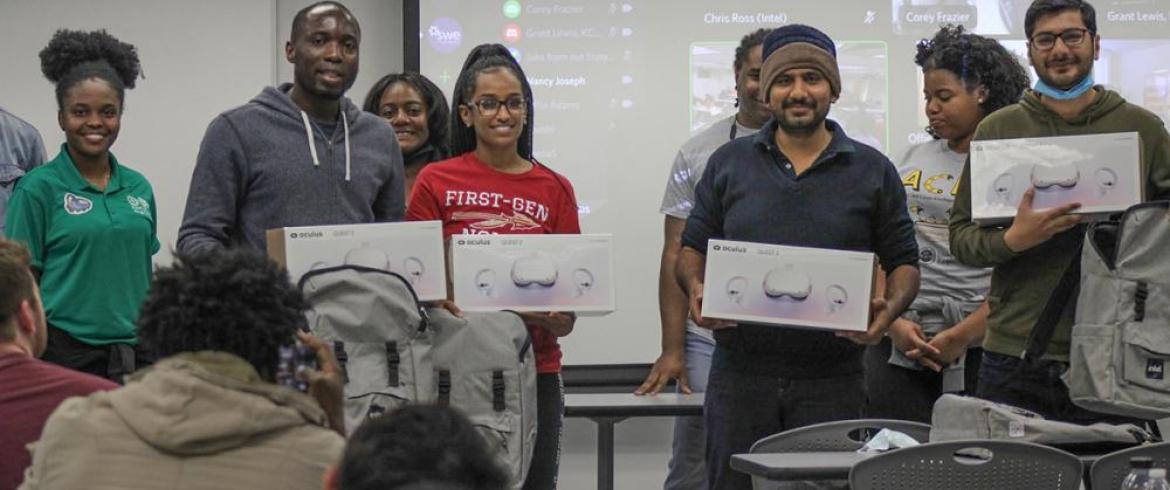
“Mask On” team members (left to right): Isaac Ogurinde (Ph.D., electrical engineering), LeWhat Aylay (M.S., electrical engineering), Ali Hassan (Ph.D., electrical engineering) and Fasih Waheed (Ph.D., electrical engineering) from the FAMU-FSU College of Engineering. (Courtesy S Bernadin)
The FAMU-FSU College of Engineering recently hosted a ten-hour “hackathon” where 34 students teamed up for the chance to use technology to address issues related to COVID. Students attended workshops, competed and showed off their skills for a grand prize and bragging rights.
So, what is a hackathon?
“It’s a competitive event where teams compete in a technical challenge for a short time, usually 24 hours,” Shonda Bernadin, Ph.D., faculty advisor for the 2022 Hackathon, said. “Students have to come up with a technology-based project and build a prototype based on software applications like web or mobile apps.”
Bernadin is an associate professor in electrical engineering at the FAMU-FSU College of Engineering and said the format was shortened to ten hours because of the pandemic.
“Our theme has always been based on artificial intelligence. This year we wanted the students to design AI solutions to help underresourced communities impacted by COVID,” Bernadin said. “Ten hours is not really a lot of time, so it was more about concept development and skill-building.”
Intel sponsored the event and hosted a technical mentoring café for the participants. Seven mentors from the company were available to answer questions and brainstorm ideas with teams. A career panel with representatives from Intel, Honeywell and the Kansas City Nuclear Security Campus were also on-hand.
“We wanted to distinguish ourselves from a traditional hackathon by incorporating hardware into solutions. We designed the event with two tracks, one for technical knowledge and the other for professional development,” Bernadin said. “Product development, customer empathy add value and value-added proposition are skills not normally taught to engineering students, we wanted to expose our participants to those skills as well.”
Middle and high school students, Victoria and William Bernadin, won an honorable mention for their project called, “Canvas Cafeteria.” They were on a team with Carter Mason, a computer science student at the university. Their group tackled food insecurity in their design of a Canvas page that integrated a food ordering tab. Canvas is a web-based learning management system used by many schools and colleges.
“We thought kids might have a tough time getting food during the COVID quarantine,” Victoria said. “So, we thought Canvas might be an option to order food since it is something students use all the time for school.”
Lewhat Aylay, Ali Hassan, Isaac Ogunrinde and Fasih Waheed won the Best Overall Solution and the People’s Choice Award, for the project, “Mask On.” They are all electrical engineering students at the college.
“‘Mask On’ is one of the groups who went above and beyond,” Bernadin said. “They designed an algorithm and did a video demonstration of their concept. The fact they came up with the idea, prototyped it, showed it, and did a demo—blew everybody away.”
The students who participated had different levels of experience. Several had prior experience with the Advanced Sensor Technologies for Applications in Electrical Engineering - Research and Innovation Excellence (ASTERIX) consortium.
ASTERIX
Bernadin is a principal investigator with ASTERIX, which is a workforce pipeline consortium that provides opportunities for minority students to excel in careers in science, technology, engineering, and math. Undergraduate and graduate students in the program have access to education, outreach and internship opportunities at ASTERIX and DoE laboratories.
“Lewhat started as an undergrad ASTERIX scholar who is now a graduate ASTERIX scholar. I’m so proud of her for continuing to pursue academic and career excellence with us! Her story demonstrates that the pipeline is working,” Bernadin said.
Other notable Hackathon projects tackled topics like facial and gesture recognition to detect COVID, matchmaking solutions for orphaned children, and revitalizing STEM education for children during a pandemic.
